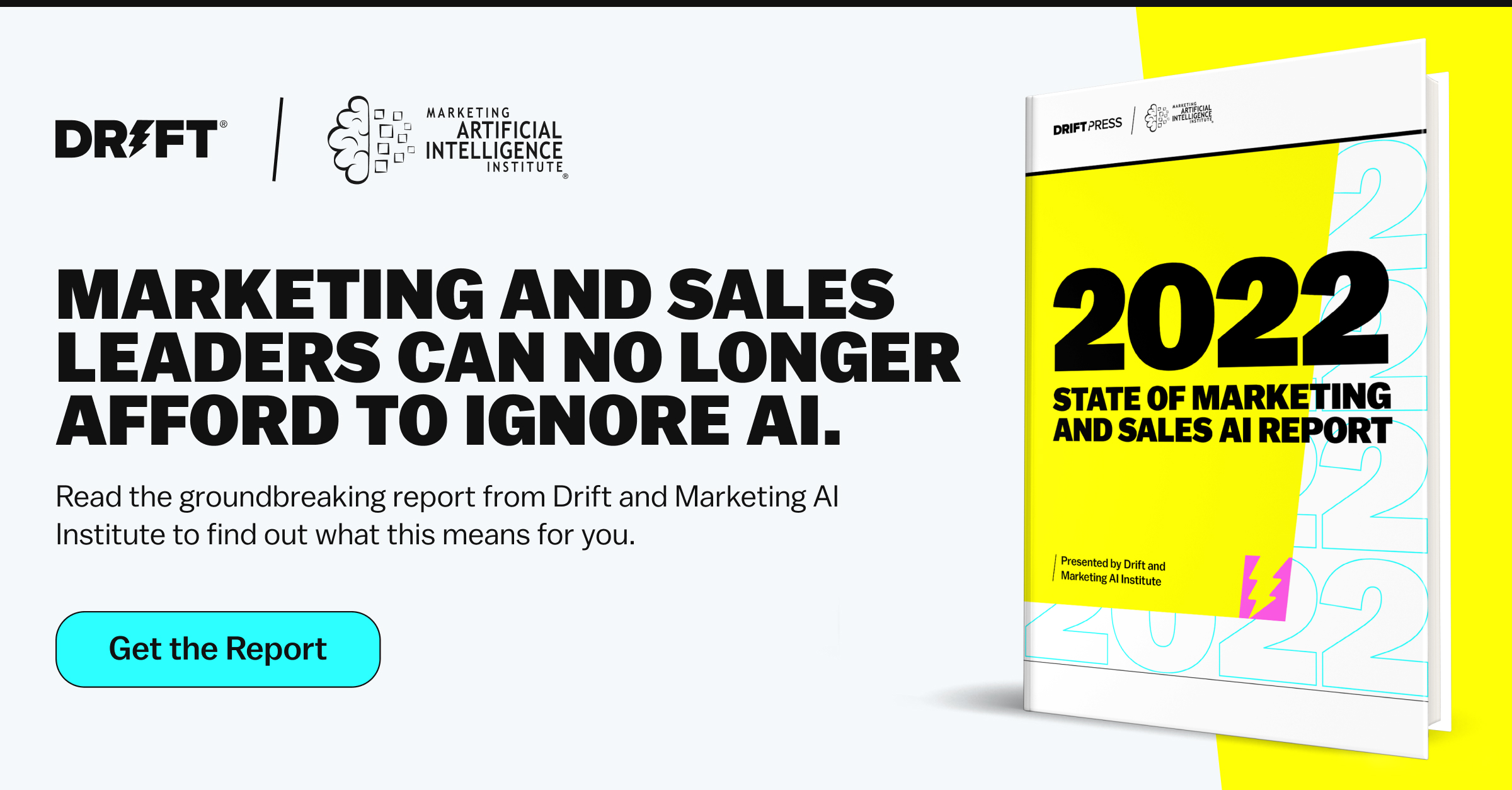Artificial intelligence is the future. No one knows that better than marketers.
But when pressed for details, most marketers will come up short. In our 2022 State of Marketing AI report, we found that 45% of marketers rate their understanding of AI as beginner.
It’s time to demystify AI — to explain how and why AI will have a huge impact on the future of marketing.
To dive deeper into the topic, I hosted a panel to discuss AI for Marketing with some of the best marketers in the business:
- Dan Ng, Executive Vice President of Innovation at PathFactory
- Randi Barshack, CMO at RollWorks
- Chris Newton, VP of Marketing at Shoreline.io (former VP of Marketing & Business Development at Intellimize)
- Lucas Welch, VP of Corporate Marketing at Highspot
Here are some of their insights on how to leverage AI in marketing to action sales, accelerate revenue, and reduce costs.
What Is AI in Digital Marketing?
I’m going to let you in on a little secret. You already use AI regularly in your daily life.
Every time you ask Alexa or Siri to set a timer, use autocorrect while texting, open your phone with Face ID, click on a recommended piece of content at the end of an interesting article, or speak with a customer support rep via chat — you’re using AI.
AI is the science of making machines smarter.
Randi breaks it down as the small decisions you make every day. As she explains, no person has problems recognizing a pen. But it’s not as instantaneous or straightforward for a computer.
A computer needs to be taught the differences between a pen and a spoon. But once it’s got those differences down, it takes a matter of seconds for a computer to scrub through millions of images of pens, where it would take us ages to do the same.
How many decisions do you make on any given day? How many times have you wished for an army of interns who could catalog all the articles in your database or comb through your website for conversion opportunities? Those tasks aren’t challenging, but they take time that most marketers don’t have.
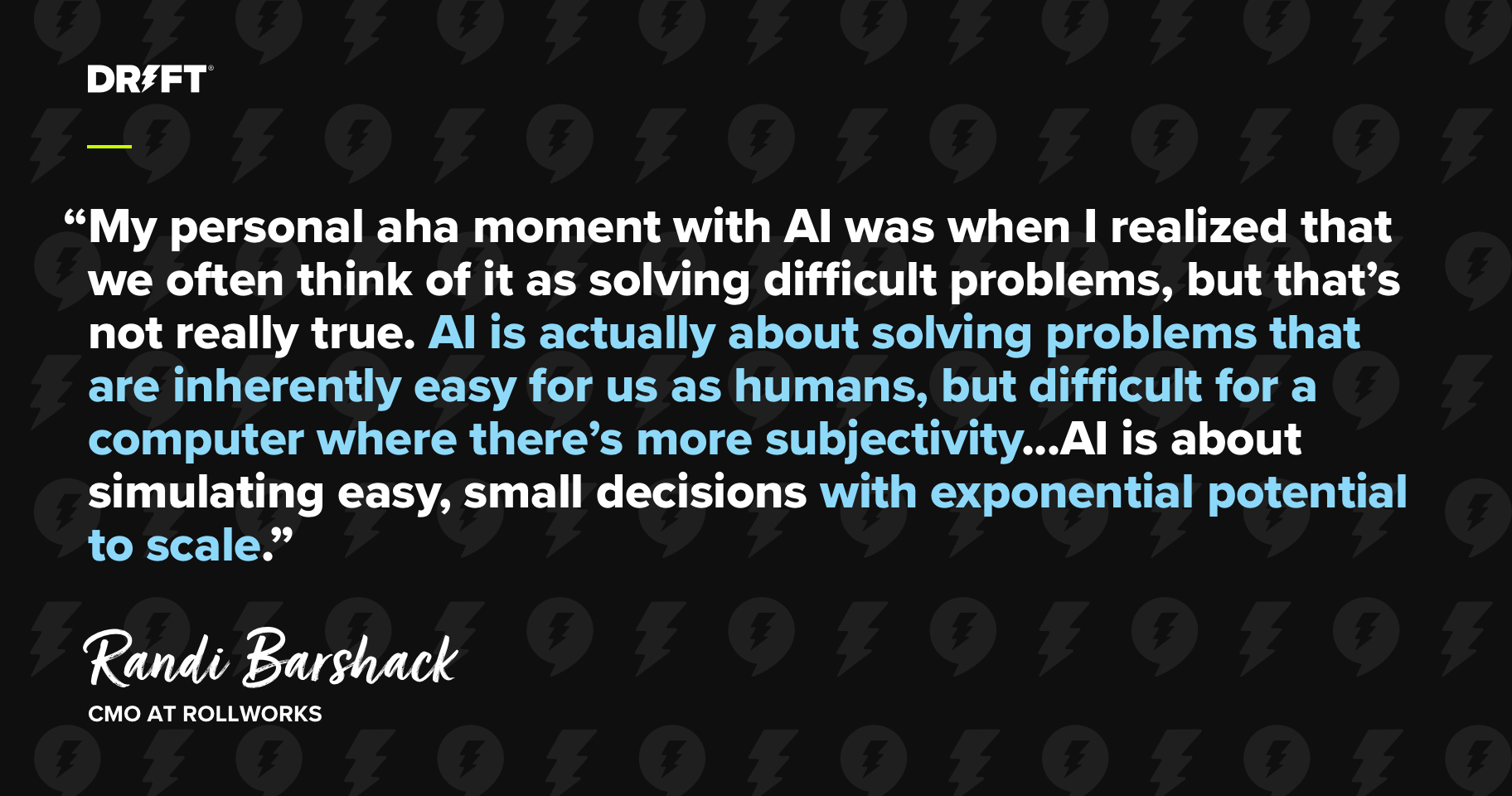
If you think about AI that way, it becomes a lot less scary. Because if AI is about making machines smarter, then AI in digital marketing is sure to make marketing smarter.
“Smarter” doesn’t mean using fancy new gadgets or finding workarounds for third-party cookies when they go away. It’s about helping marketers and salespeople get closer to the customer so they can better serve them on a one-to-one or one-to-many basis.
Why Digital Marketers Need AI to Level Up
Marketing teams that don’t embrace AI sooner rather than later are going to be left behind.
The good news? The benefits of AI have already been proven. And it’s already here. It’s not some shiny new social media channel that you’ll have to hop on without a strategy (we’re looking at you, TikTok 👀).
It can be easy to write off something that’s new and exciting because you don’t know what that new channel can do or what impact it might have. That was exactly how Lucas felt about Twitter when he started off as a PR manager. “I said, ‘That’s silly. That’s never going to be a key part of PR.’ And now you could argue that social media is the primary pillar of any modern PR strategy.”
Lucas argues that we’re in the same spot now with AI.
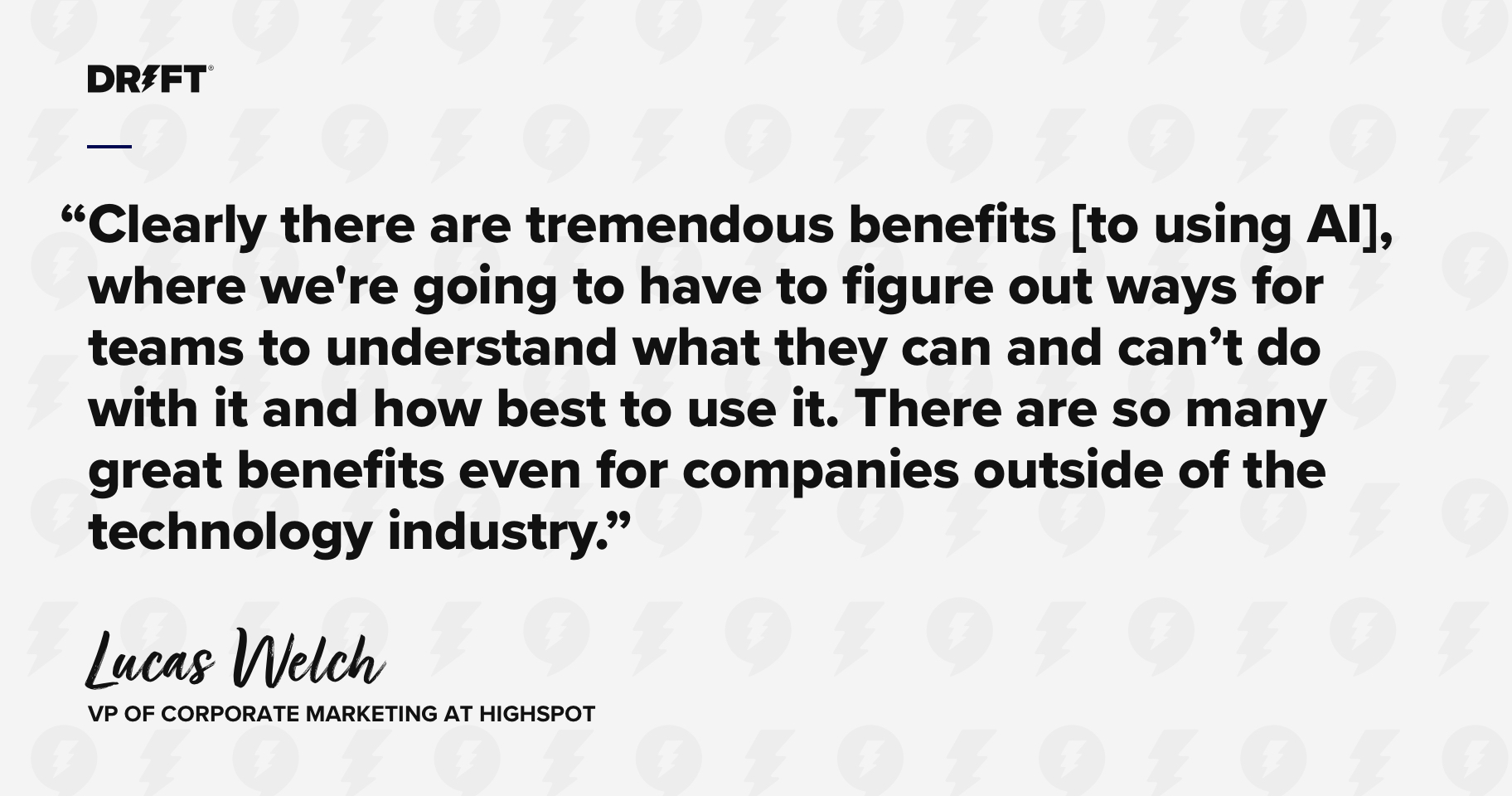
When it comes to the benefits of AI, it’s impossible to ignore the revenue impact it has on marketing and sales.
In fact, McKinsey found that the annual impact of AI and other analytics on marketing and sales is a whopping $5.9 trillion. And in our State of Marketing AI report from this year, we surveyed over 400 marketers and found that 41% were already using AI to accelerate revenue.
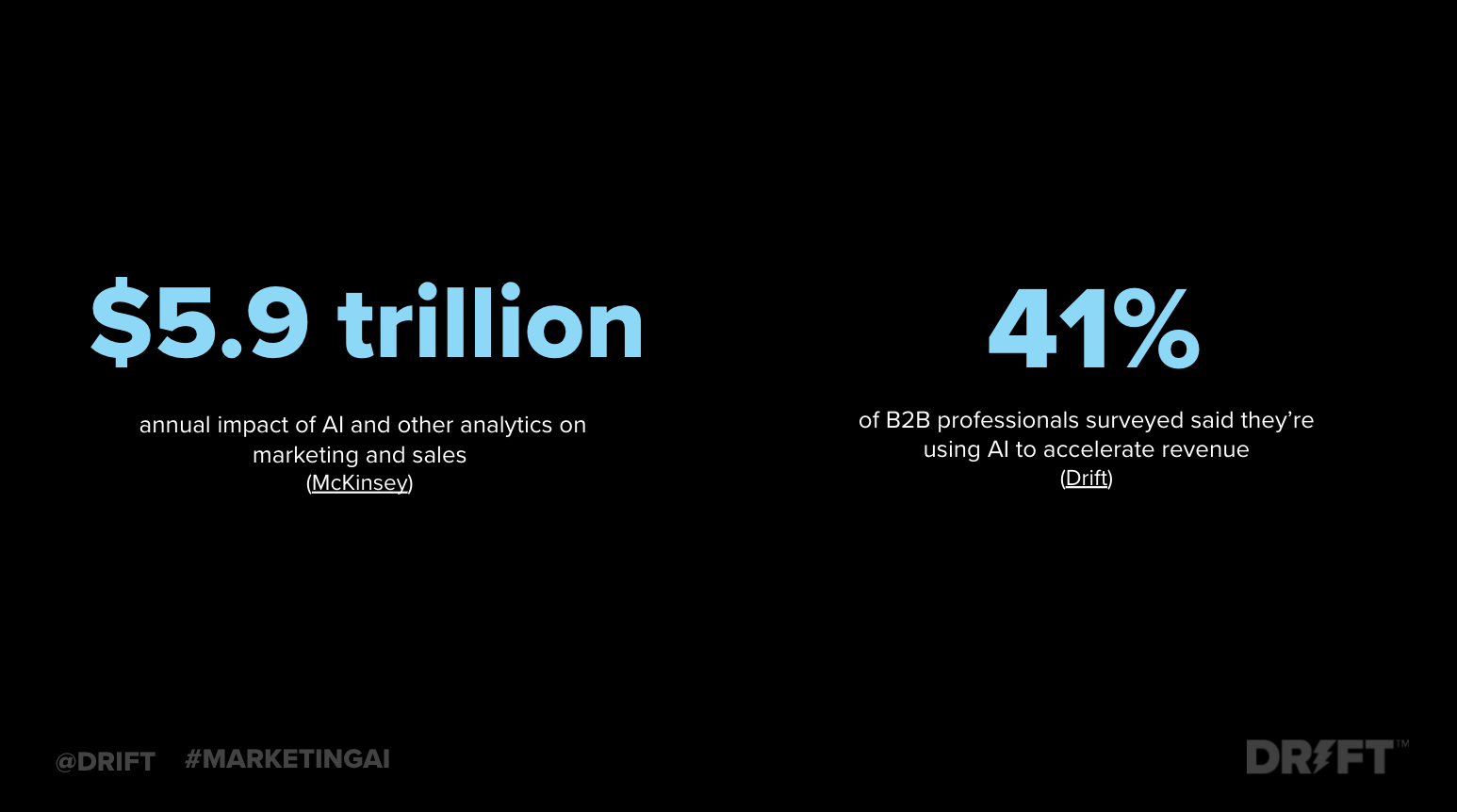
So, what’s the hype all about?
With AI, marketers can create personalized consumer experiences at scale, drive down costs, generate greater ROI on campaigns, and much more 👇
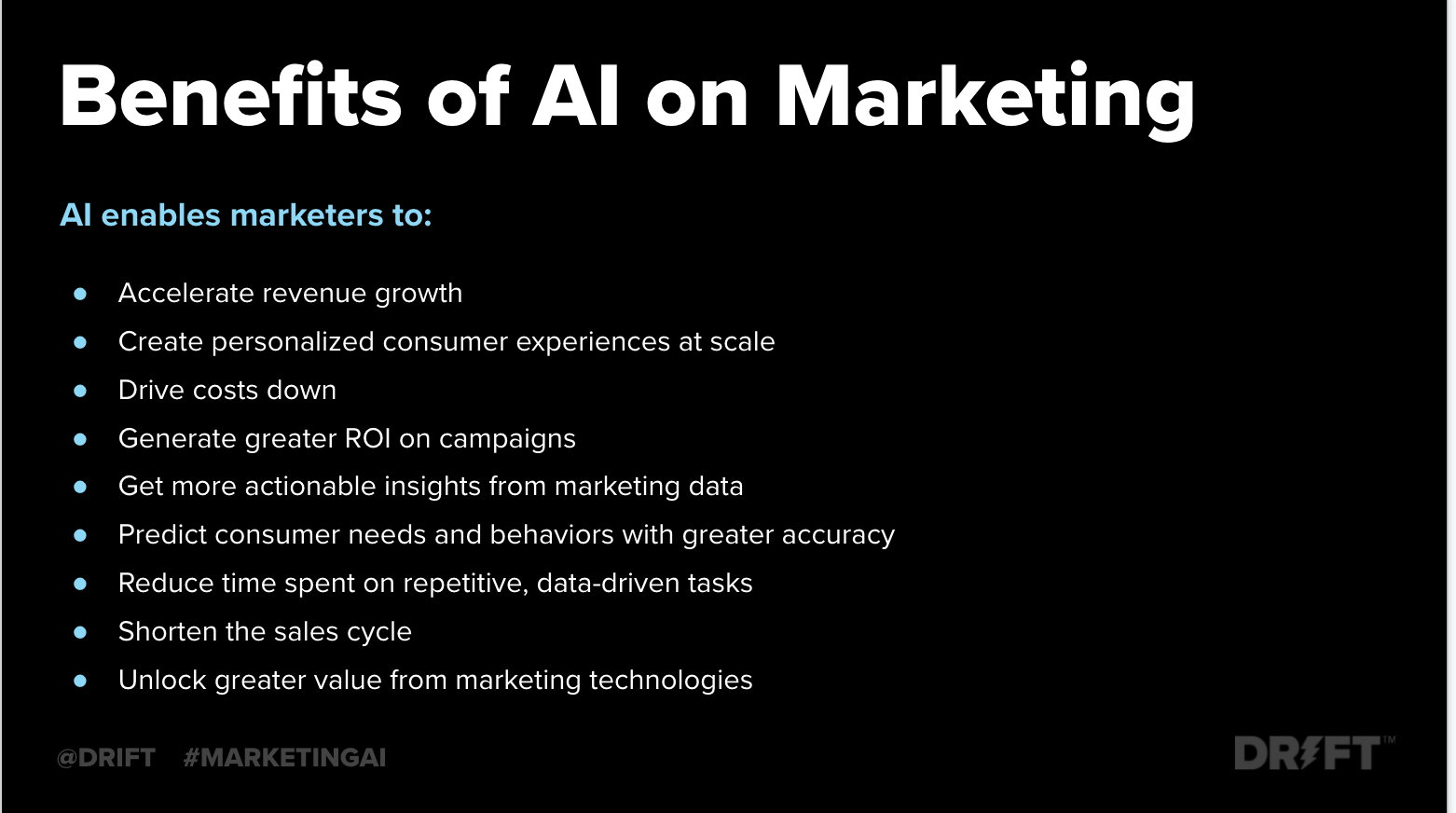
That sounds pretty incredible, right? But knowing how awesome AI can be for your marketing and sales teams isn’t the same as making the magic happen.
3 Ways for You to Get Started with AI in Digital Marketing
In our State of AI Marketing report, we asked respondents: “Assuming AI technology could be applied, how valuable would it be for your team to intelligently automate each of the use cases below?”
From that question, we found out the top 10 use cases for marketers today. Here they are in order of most valuable to least valuable:
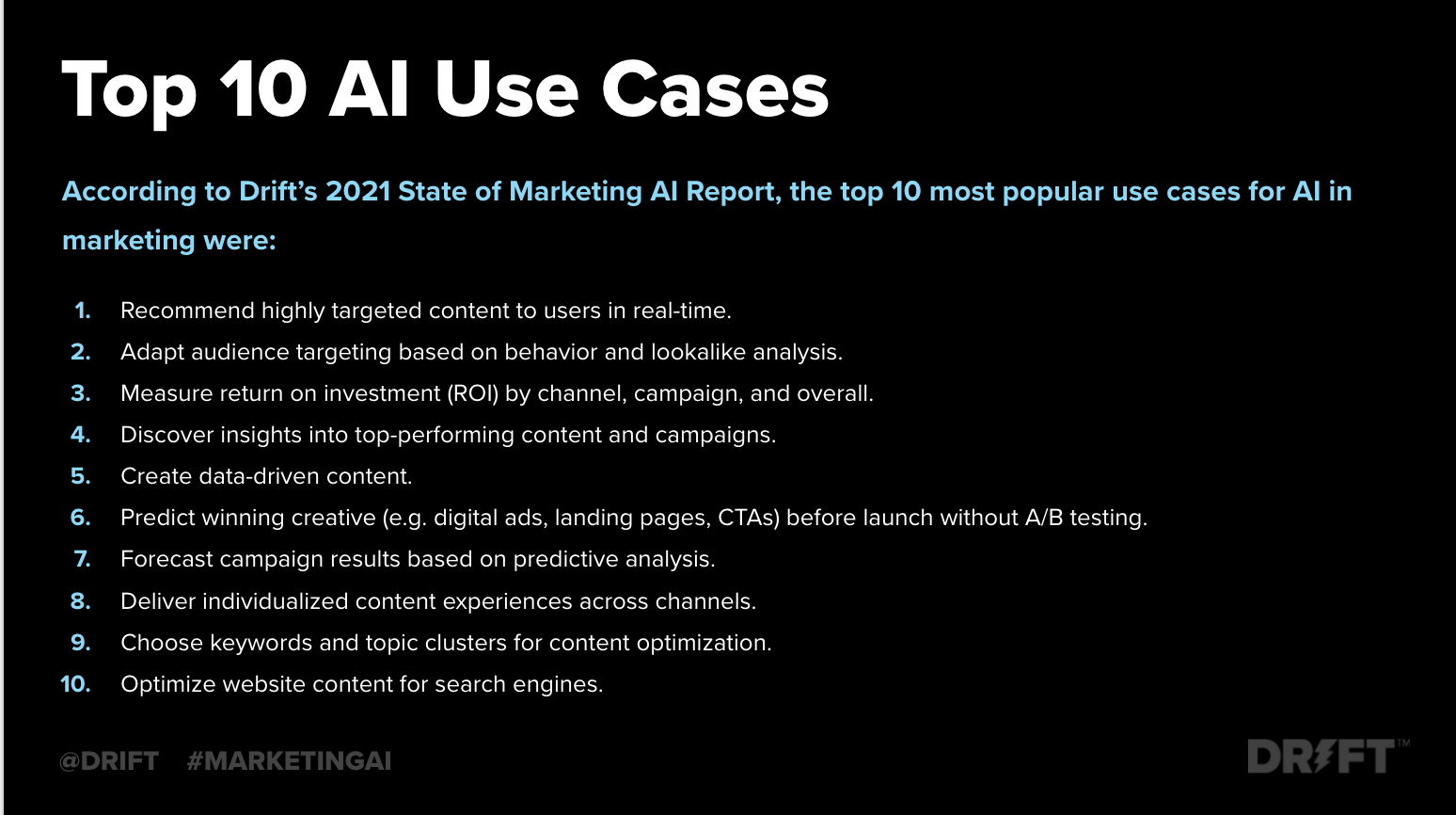
These 10 use cases are all slightly different, but they have one thing in common: easier, faster, and more personalized experiences for your customers and prospects.
I asked the panelists to weigh in with how AI has benefited them the most. Here are three ways that their teams use AI in their day-to-day operations.
1. Recommend, Measure, and Create Better Content
Content tends to be scattered. It’s everywhere, and that means it’s hard to see which web page is related to which ebook or PDF or blog post. For Dan, AI has revolutionized how PathFactory manages and organizes their content.
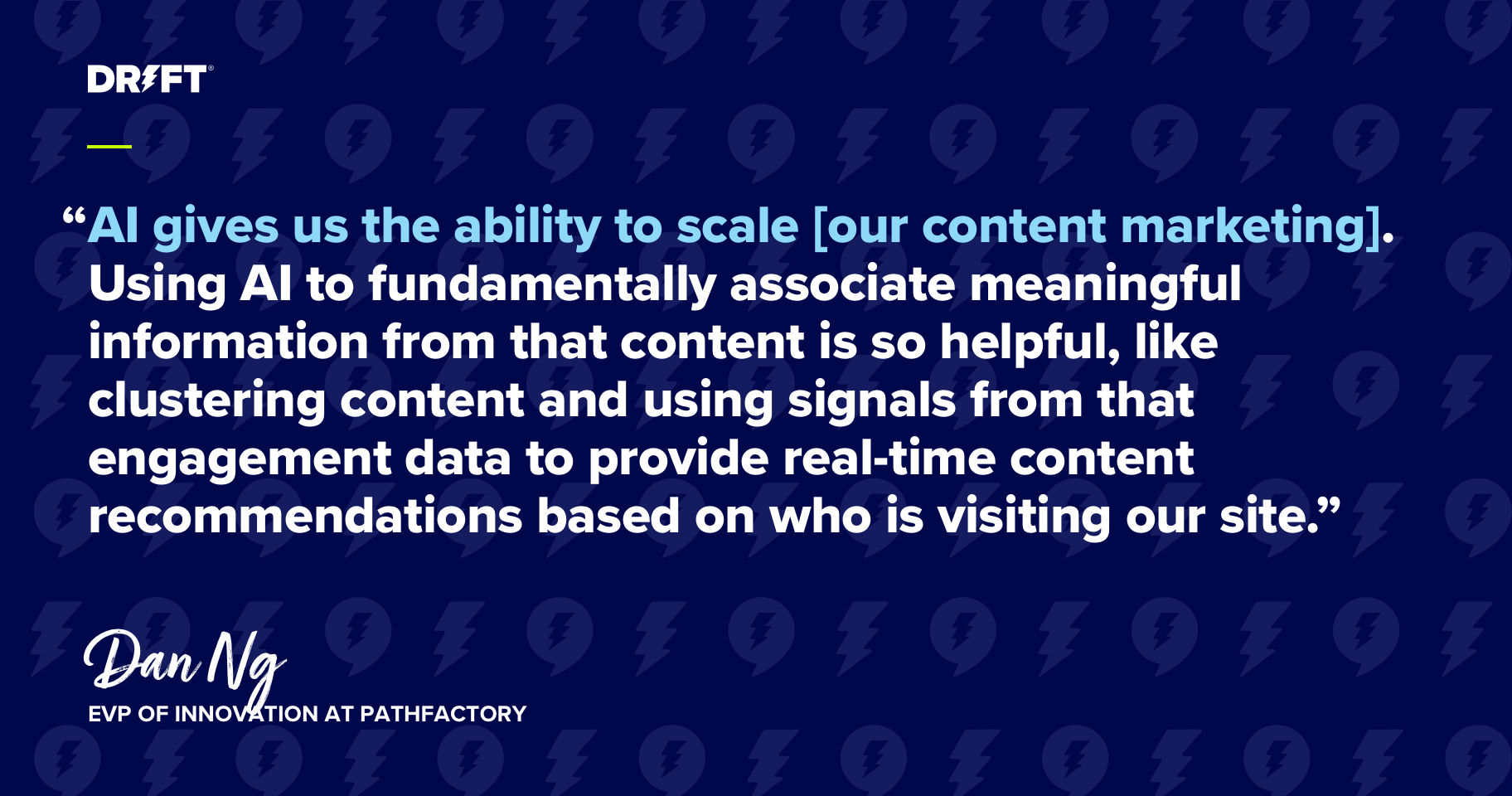
The most important part of content marketing is its impact on the customer — whether or not it will lead to conversions or engagement on a webpage. The larger your content program, the more challenging it can be to predict what is and isn’t going to work.
Look at Netflix or Amazon. Your buyers are conditioned to want those same personalized B2C experiences in the B2B world.
This means successful companies have to build a network of content and product recommendations tailored exactly to a customer — based on the buyer’s account, where they are in the funnel, or how they’ve interacted with you previously.
As Dan sums up, “You don’t just want a general blanket recommendation.”
With the information provided by AI, you can also start off with better content. Once you understand what performs well, you can make creative decisions so that your content resonates with prospects, partners, and customers — and delivers better results.
2. Providing a Seamless and Personalized Web Experience
Most B2B websites are built for the brand or the marketer, not the customer. AI is here to change that in a big way.
As Chris puts it, the problem is that marketers don’t spend enough time thinking about what happens once they get potential buyers on their website.
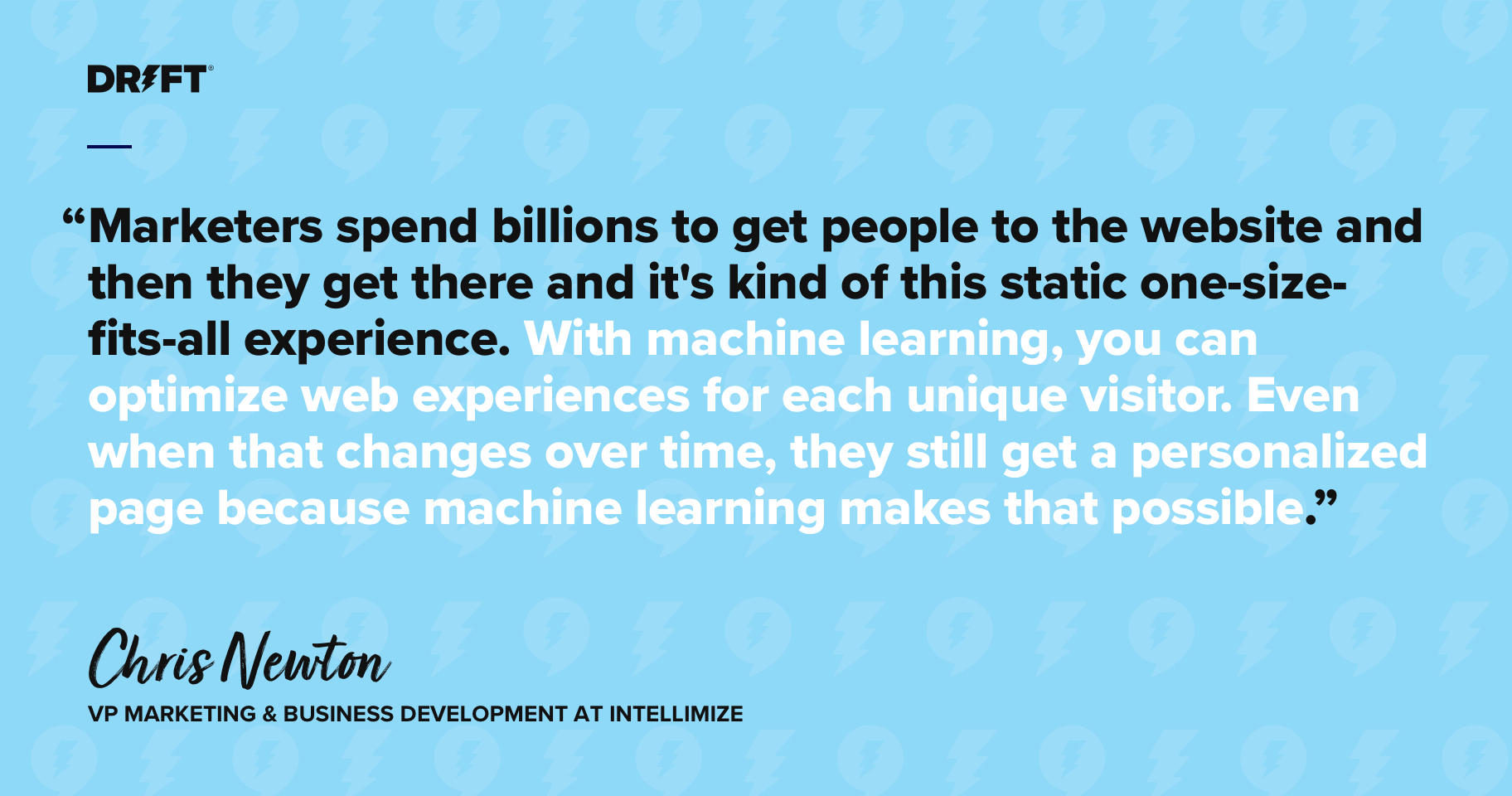
This takes recommended content one step further with optimized headlines, images, and page layouts. Even logo lists and customer stories can be personalized so that it’s more relevant for the site visitor.
AI can capture contextual data in real-time and serve up unique web pages tailored to each visitor. Then, sales and marketing teams can take advantage of the opportunities that this creates. Using AI, we can finally fulfill our promise of delivering the right message at the right time to the right person.
3. Delivering on Account-Based Marketing
Better content and better web experiences naturally mean better relationships with your prospects. While it may sound like AI is the opposite of personalization, that’s just not true. AI is the key to unlocking personalization at scale. It’s what makes account-based marketing (ABM) possible.
AI saves time, even when you’re working with a smaller list of target accounts.
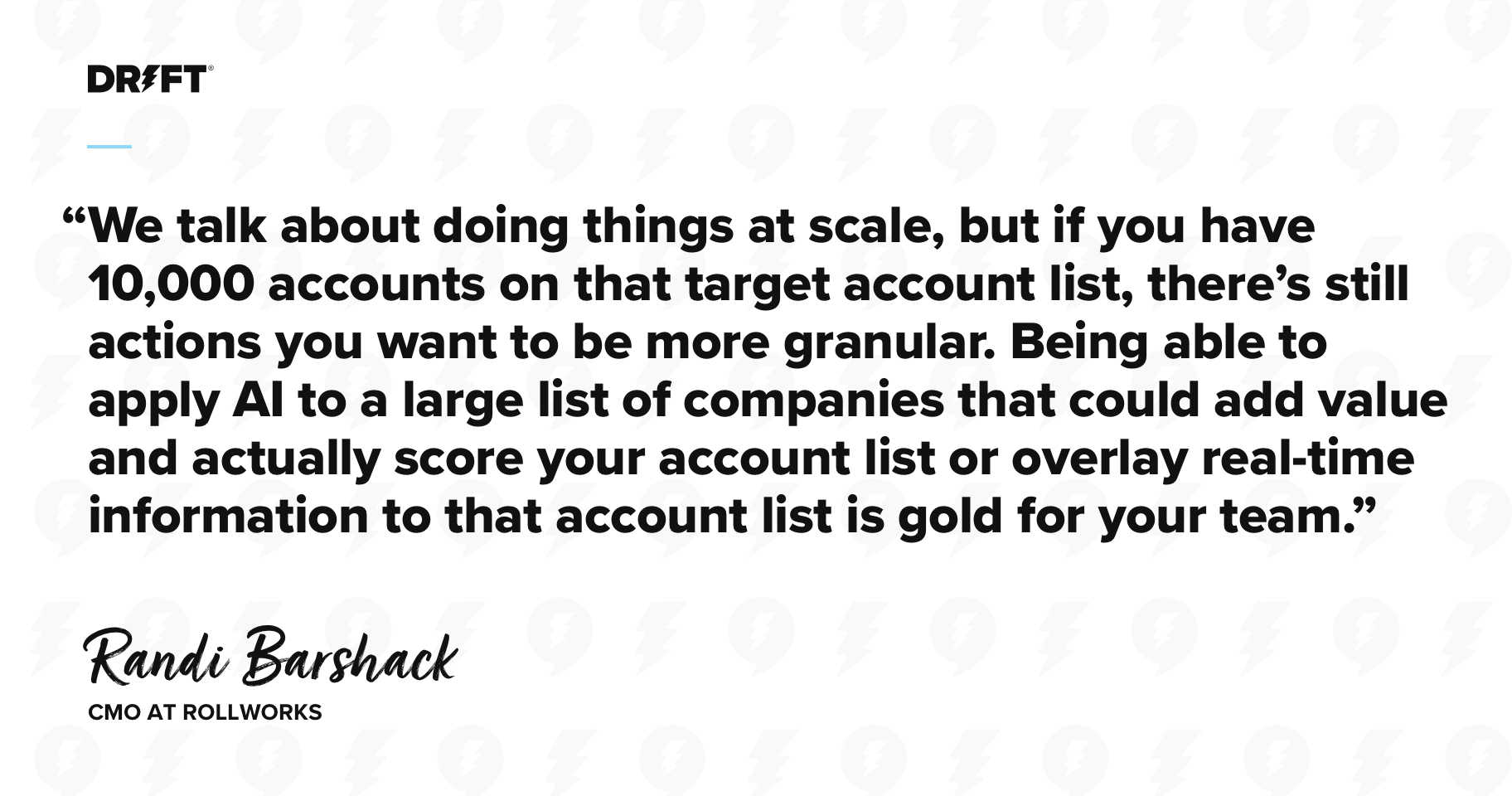
It’s the difference between knowing the 300 accounts in your top tier list and actively targeting the 150 that have signaled their interest in your solution. Having that information allows your team to focus on what they’re good at — building relationships with buyers by having conversations that count.
The same applies to ABM campaigns. Randi uses the example of gift cards. Instead of sending $5 Starbucks gift cards to all target accounts, you can use AI to analyze your data and change up the offer depending on how valuable that account is. So, if a top-tier account lands on your website, you can give them a $100 GrubHub gift card instead.
In ABM, you’re targeting thousands of accounts, hundreds of which could be on your website at any given time. Where do those accounts fall in your ideal customer profile (ICP), and what’s going to be the best for your business? AI can not only help you identify accounts that fit your ICP but also direct your efforts to those target accounts that show the highest intent.
It’s basically impossible to achieve this level of personalization — where the account feels special and taken care of — without AI.
Embrace the Future of AI in Digital Marketing
Breaking the status quo can be a scary thing. But we all know it’s a trap.
Doing what you know feels safe. And with so many depictions of AI overlords in popular culture, it’s no wonder marketers don’t trust the technology just yet.
But here’s the thing: If you don’t invest in AI today, you’ll be left behind.
Don’t just take that from me. I asked each of the panelists to predict where AI would be in the next five years, and their answers showcased the massive potential that AI has for the future. Whether that’s eliminating decision fatigue or opening up more avenues for creativity, AI promises a more optimized B2B buying experience.
At the same time, AI can also impact the way we think about and interact with the world. AI will likely raise questions about diversity, equity, and inclusion, which may be good grounds to hold companies to a higher standard of responsibility.
But most of all, the future of AI isn’t about giving away control. It’s about supporting humans. And for us marketers, AI will answer our needs so that we can ultimately be better at our jobs.
The age of intelligent automation has begun — and most marketers know it. But the industry as a whole has a lot of work ahead.
Forward-thinking organizations are already using AI to accelerate revenue and reduce costs. In the process, they are building sustainable competitive advantages for their products and people. So, what are you waiting for? Embrace AI, and step into the future of digital marketing.






